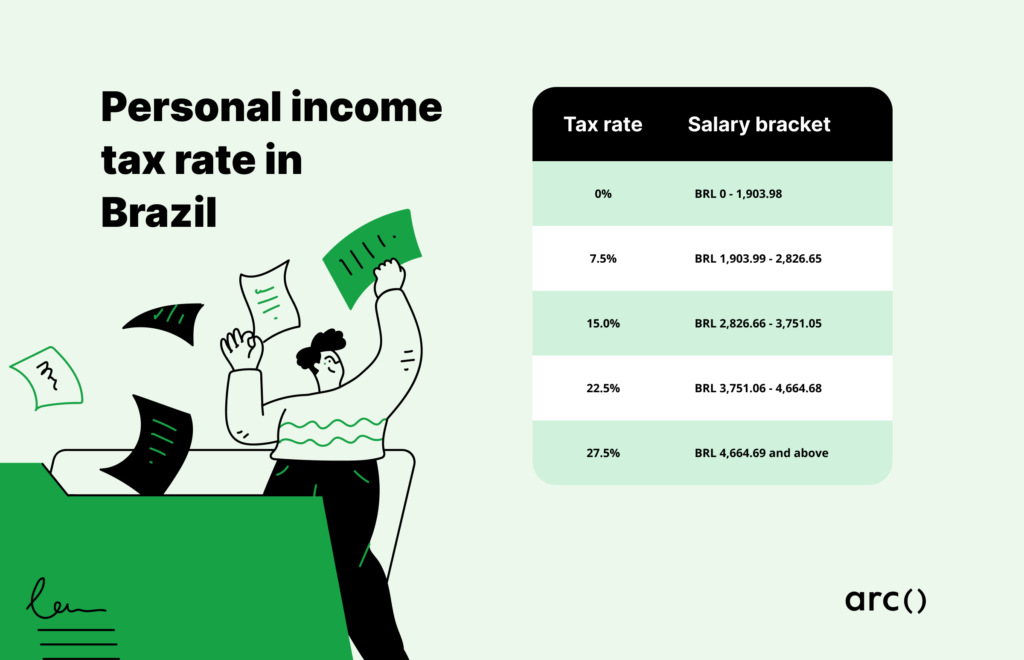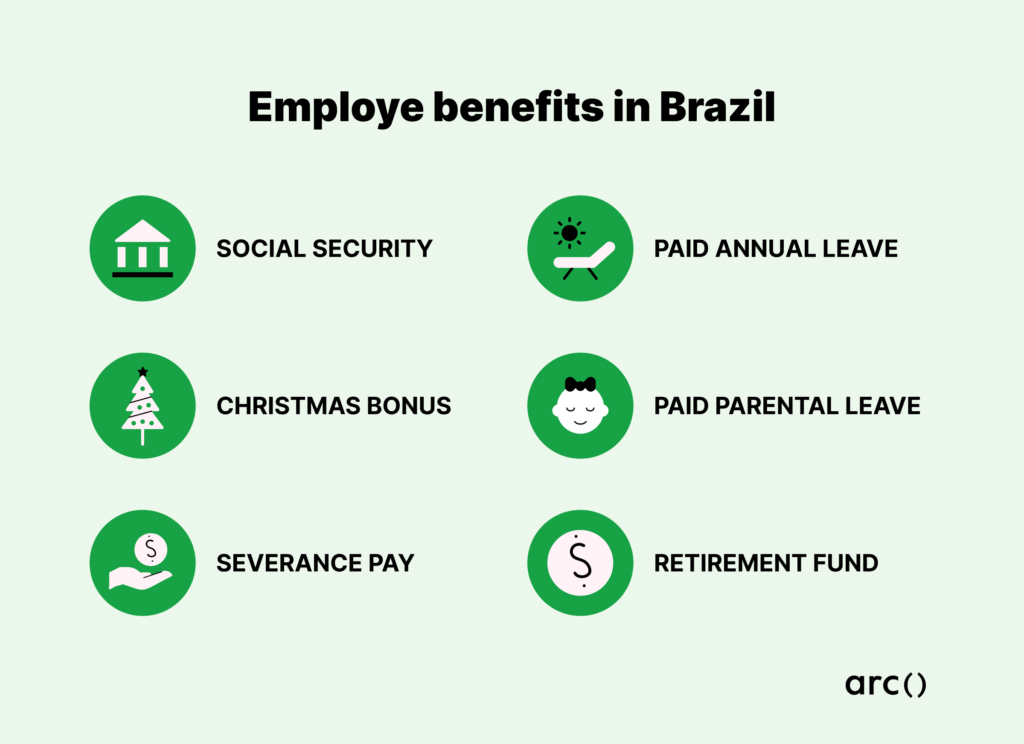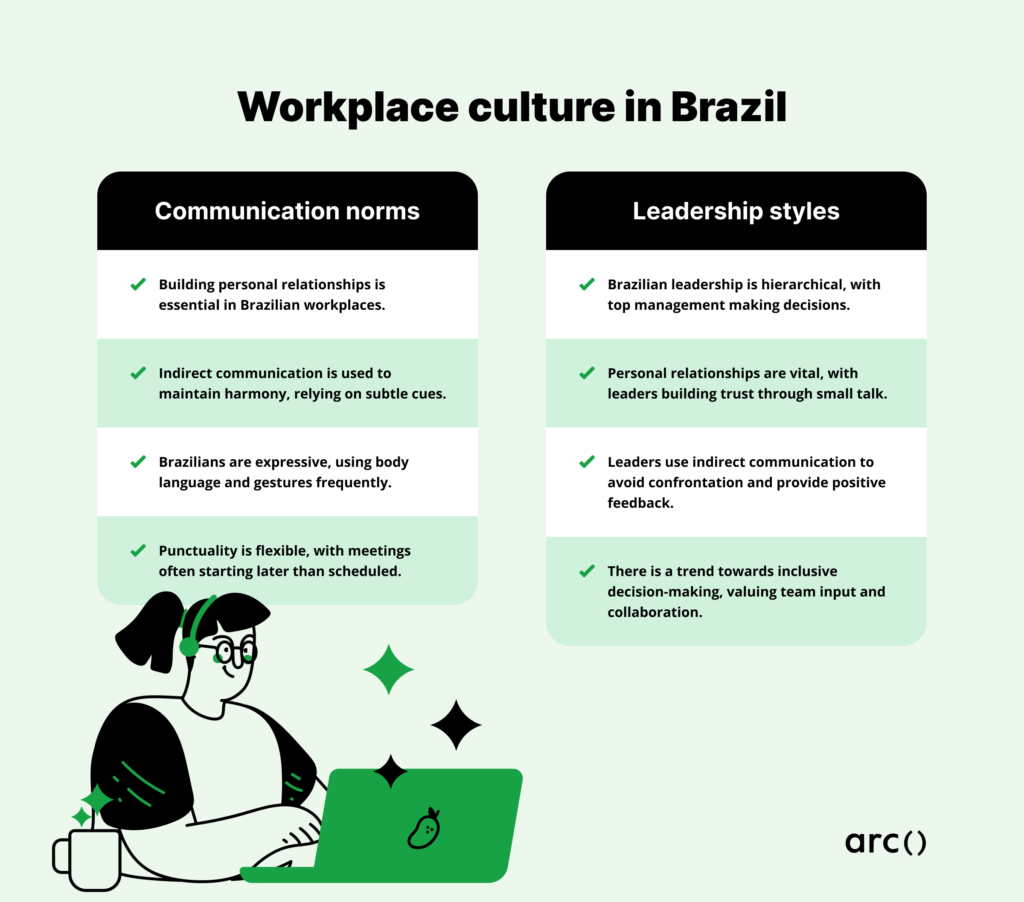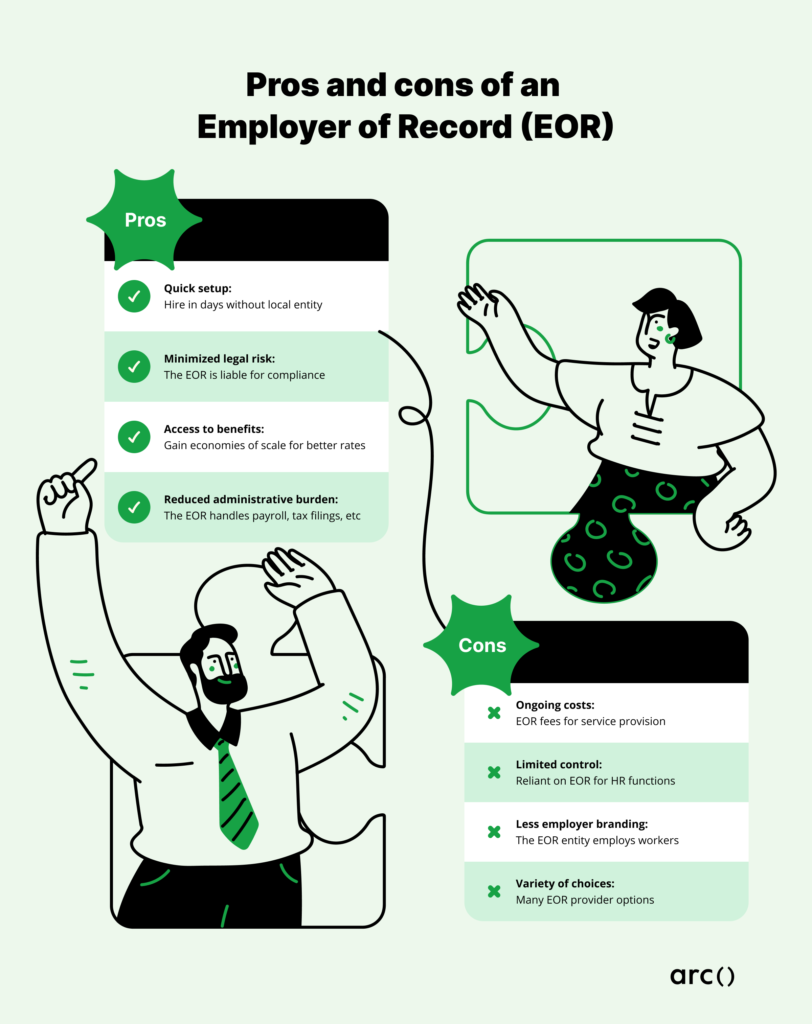Thinking about expanding your team? The idea to hire in Brazil could be a smart move, no matter where your company is based.
Brazil is home to a skilled, multilingual workforce, and labor costs are lower compared to the U.S. and Europe. However, Brazil’s employment laws are strict, and compliance is key. These laws cover everything from employee benefits and wages to termination, overtime, and social security.
Brazil’s vibrant culture also influences workplace dynamics. From the importance of personal relationships to the value placed on loyalty and dedication, understanding these cultural aspects is essential.
Despite the need to navigate both legal and cultural landscapes, to hire in Brazil for good employees offers many advantages:
- Affordable, skilled labor
- Multilingual talent pool
- Strong work ethic
- Tech expertise and innovation
This guide will walk you through Brazil’s labor regulations and cultural considerations, helping you tap into its top talent with ease.

Benefits of Hiring Brazilian Talent
- Affordability: Hiring skilled labor in Brazilian market is more affordable than in the U.S., Europe, or even other parts of Latin America. You can get high-quality work without overspending.
- Multilingual Skills: Many Brazilians speak English, Spanish, and of course, Portuguese. So, it’s a major advantage to hire in Brazil if your business operates internationally.
- Cultural Diversity: Brazil’s cultural diversity adds fresh perspectives and creativity. So, diverse teams often understand global markets better.
- Strong Work Ethic: Brazilians are known for their dedication and resilience. So, they consistently deliver high-quality work on time.
- Tech Expertise: Brazil’s tech scene is booming. From software developers to cybersecurity experts, you’ll find highly skilled tech professionals to hire in Brazil.
- Innovation: Brazilians excel in creative thinking and innovation. Whether it’s developing new products or crafting unique marketing strategies, you can rely on their ingenuity.
Ready to hire top global talent and save?
- Access to 450,000+ talent in 190 countries
- Freelance or full-time remote hires
- Save up to 80% vs local US rates
Local Labor Laws in Brazil
Hiring employees in Brazil requires navigating specific legal requirements. So, familiarity with Brazil’s labor laws is essential for compliance and building strong employer-employee relationships.
Work Laws and Regulations
Brazil’s local laws are governed by a legal entity called the Consolidação das Leis do Trabalho (CLT), which regulates working hours, wages, and benefits. So, if you plan to hire in Brazil, here are some key provisions you should know about:
- Maximum Working Hours: Employees can work up to 44 hours per week or 8 hours per day.
- Overtime: Overtime is paid at 50% more than the regular wage.
- Minimum Wage: The national minimum wage for 2024 is R$1,412 per month (around $290 USD), slightly higher than stated. Software developers in Brazil typically earn R$11,067 to R$32,394 per month depending on experience and location. This translates to around $2.036 to $5,960 USD every month.
- Paid Annual Leave: Employees are entitled to 30 calendar days of paid leave per year.
- Maternity Leave: Maternity leave lasts for 120 days. But, there’s an option to extend to 180 days.
- Paternity Leave: 5 days of paternity leave are provided.
Types of Employment Contracts in Brazil
In Brazil, different contract types suit different work needs. When hiring contractors, choosing the right employee contracts depends on the job duration, role, and commitment required. Here’s a breakdown of the most common employment contracts:
Indefinite-Term Contract
This is the most common contract used for a long term hire in Brazil. It has no set end date, offering job security and stability. Indefinite-term contracts offer full rights and benefits like paid leave, overtime pay, and severance protections, making them ideal for permanent positions.
Fixed-Term Contract
A fixed-term contract suits temporary or project-based roles. It has a set end date and you can use it for seasonal work or specific projects. However, its limit is two years and you can only renew it once.
Intermittent Contract
This contract is designed for irregular or seasonal work, where the employee is called to work as needed. Intermittent contracts are flexible, allowing you to hire workers for specific projects or peak periods without continuous employment. So,you will only need to pay employees for hours worked and receive proportionate benefits.
Part-Time Contract
For roles that require fewer hours than a full-time position like independent contractors, a part-time contract is used. Employees work less than 44 hours per week, with reduced benefits and the employee’s salary is proportional to their hours worked. This is ideal for businesses needing flexible or reduced hours.
Each contract type comes with specific legal obligations based on local laws, so understanding which one fits your business needs is crucial for ensuring compliance with Brazilian employment laws.
Work Permits and Visas for Foreign Nationals
If hiring international employees outside Brazil, they’ll need a work permit and visa. The process varies depending on nationality and the job. Common options include:
- Temporary Work Visa (VITEM): For short-term assignments, valid for up to two years.
- Permanent Work Visa: For those planning long-term work in Brazil.
- Mercosur Visa: Simplifies the process for citizens of Mercosur countries (Argentina, Paraguay, Uruguay, etc.).
Payroll, Income Tax, and Compliance in Brazil
Here’s what you need to know about wages, working hours, and leave policies in Brazil.
Minimum Wage and Salary Expectations
In 2024, the national minimum wage is set at R$1,412 per month (roughly $290 USD). Software developers in Brazil usually earn between R$11,067 to R$32,394 monthly, depending on their experience and location, which equates to about $2,036 to $5,960 USD.
Working Hours and Overtime
The standard workweek is 44 hours, with no more than 8 hours per day. Overtime is paid at least 50% above the regular rate. Employees are entitled to a 30-minute break for every 4 hours worked.
Leave Policies
Brazil has generous leave policies:
- Annual Leave: 30 days of paid leave after 12 months of work.
- Sick Leave: Employees are entitled to paid sick leave for the duration of their illness, as long as a medical recommendation is provided. There is no strict limit on the number of sick days. However, if the illness requires more than 15 consecutive days of leave, the employer must report the case to Social Security for further evaluation and potential extended benefits.
- Maternity Leave: 120 days of paid leave, with an option to extend.
- Paternity Leave: 5 days of paid leave for new fathers.
Payroll and Taxes
Payroll in Brazil is done monthly, with payments at the end of each month. Employers handle several tax obligations, including:
- Income Tax (IRRF): Progressive tax deductions on salaries, based on income in Brazil, the IRRF (Imposto de Renda Retido na Fonte) is deducted directly from an employee’s paycheck by the employer. Tax rate varies according to income brackets, ranging from 7.5% to 27.5%. The more an individual earns, the higher the percentage of income taxed.
- Social Security Contributions: Employers contribute around 20% of the social security contributions, while employees contribute between 7.5% and 14%, based on their earnings.
- Severance Fund (FGTS): Employers contribute 8% of their monthly salary to this fund, which supports workers in case of job loss.
To avoid penalties, stay on top of payroll deadlines and tax contributions. It’s important to consult local legal and accounting professionals for compliance with tax regulations.

Employee Benefits
Full-time employees in Brazil are entitled to a range of key benefits, including social security, paid time off, sick leave, disability leave, parental leave, a pension, and a mandatory 13th-month salary.
- Social Security: Employees are covered under Brazil’s social security system (INSS), which provides protection in cases of illness, disability, retirement, or death.
- Paid Time Off: Full-time employees are entitled to annual leave of at least 30 days with vacation pay, which can be split into multiple periods depending on the agreement with the employer.
- Sick Leave: Employers must pay for the first 15 days. After that, social security takes over and provides compensation for longer-term illnesses.
- Disability Leave: In the event of a work-related injury or illness, employees can take disability leave, during which the INSS provides financial support based on the employee’s contributions.
- Parental Leave: Maternity leave in Brazil is 120 days, and paternity leave is 5 days, both fully paid by the employer. Some employers may offer extended leave under government programs.
- Pension: Employees contribute to the national pension system through social security, which provides a pension upon retirement based on the number of years worked and contributions made.
- 13th-Month Salary: This is a legally mandated bonus paid to all full-time employees. It is equivalent to one month’s salary and is typically paid in two installments at the end of the year.
Statutory vs. Market-Driven Benefits in Brazil
Employee benefits in Brazil fall into two main categories: statutory (mandatory) and non-statutory (optional).
Statutory benefits are those required by law and are governed by the Instituto Nacional do Seguro Social (INSS). These include overtime pay, social security, paid holidays, annual leave, maternity and paternity leave, sick and disability leave, and pensions.
Non-statutory benefits, on the other hand, are not mandated by the government and are provided by employers as additional perks to attract and retain talent. These can include supplemental health insurance, meal vouchers, or professional development opportunities, offered at the company’s discretion. vouchers, or professional development opportunities, offered at the company’s discretion.

Looking to hire expert marketers? Explore our network of vetted talent to:
⚡️Hire 4x faster by skipping the manual search
⚡️Save up to 80% with top global hires
⚡️Get real human support from our team
Hire top marketing experts now →
The Hiring Process in Brazil
Hiring top talent in Brazil requires a well-thought-out strategy that aligns with local practices, cultural expectations, and legal requirements. Here’s a comprehensive guide to attracting, assessing, and onboarding employees in Brazil.
1. Developing a Clear Hiring Strategy
A successful hiring process starts with a clear strategy tailored to the Brazilian job market. Begin by creating comprehensive job descriptions that not only list the role’s responsibilities and required skills but also emphasize your company’s culture, values, and opportunities for career growth.
Brazilian professionals, particularly younger workers, are often drawn to companies that showcase a strong commitment to employee well-being, work-life balance, and long-term development.
Key Components for Job Descriptions:
- Role-specific duties and responsibilities
- Required qualifications and technical skills
- Company culture, mission, and values
- Growth and career advancement opportunities
- Benefits package, including health coverage, paid leave, and flexible work arrangements
2. Sourcing Talent
Attracting the right candidates in Brazil involves leveraging multiple recruitment channels. Local job boards, professional networks, and partnerships with educational institutions are all essential tools to reach a diverse pool of talent.
In some cases, regional differences may also influence the approach; for example, cities like São Paulo and Rio de Janeiro are major hubs for professional talent, while other regions may require more specialized outreach.
Common Talent Sourcing Methods:
- Local Job Boards: Popular portals like Vagas.com and Catho are widely used by Brazilian professionals.
- Professional Networks: LinkedIn remains a powerful platform for sourcing candidates and building relationships in Brazil.
- University Partnerships: Partnering with top universities and technical institutions is a great way to attract emerging talent, particularly for internships or entry-level roles.
- Recruitment Agencies: For specialized or high-level roles, working with a recruitment agency familiar with the local market can streamline the process.
3. Interviewing and Assessing Candidates
Interviews in Brazil typically have multiple stages, involving HR representatives, direct supervisors, and sometimes higher-level executives. During the process, it’s crucial to evaluate both the technical skills required and the candidate’s cultural fit with your organization.
Interviewing Best Practices:
- Behavioral and Situational Questions: Use questions that help assess how a candidate has handled real-world challenges to understand their problem-solving skills and adaptability.
- Technical Assessments: For technical roles, incorporate practical tests or case studies to gauge proficiency.
- Cultural Fit: Brazil values personal relationships and team dynamics, so it’s important to assess how well a candidate aligns with your company’s culture and values.
4. Navigating Legal and Contractual Requirements
Before making a formal offer, ensure compliance with Brazil’s employment laws. Employment agreements and contracts must outline worker rights, salary, benefits, and working conditions according to the Consolidação das Leis do Trabalho (CLT).
It’s advisable to consult with a legal professional or an Employer of Record (EOR) to manage these administrative details.
5. Crafting a Strong Job Offer
Once the selection is made, present the job offer clearly. Highlight salary, health benefits, paid leave, and opportunities for professional development. In Brazil, employees place significant importance on these factors when deciding whether to accept a job offer.
6. Onboarding and Integration
A well-planned onboarding process is essential to set up new hires for success. This should go beyond paperwork and focus on integrating the employee into the company culture and ensuring they understand their role and responsibilities.
Best Practices for Onboarding:
- Initial Training: Provide training sessions to help the new hire understand their role, the company’s operations, and its values.
- Mentorship and Support: Pairing new employees with mentors or assigning a “buddy” can foster a smoother transition.
- Regular Check-ins: Schedule meetings in the first few weeks to gather feedback, address concerns, and ensure the employee feels supported.
7. Boosting Engagement and Retention
Employee retention is key to maintaining a productive workforce. Offering growth opportunities, recognizing achievements, and fostering a positive work environment help ensure long-term satisfaction.
Key Retention Strategies:
- Career Development: Provide clear pathways for promotions and skill development.
- Recognition and Rewards: Regularly acknowledge employee contributions to keep motivation high.
- Work-Life Balance: Offering flexible work arrangements and showing empathy for personal needs is especially valued in Brazil.
Cultural Considerations for Hiring Employees in Brazil
Understanding Brazil’s cultural values is essential for working effectively with Brazilian employees, helping you foster productive relationships and a cohesive team environment.
Formality and Hierarchy
Brazilian workplaces often have a clear hierarchy, with decisions passing through multiple levels of management. Superiors are expected to provide guidance, and employees tend to show respect for authority. Criticism is best handled privately to avoid embarrassment.
Communication Styles
Personal relationships are highly valued in Brazilian work culture. Meetings often begin with small talk to build rapport, and this shouldn’t be rushed. Communication is typically warm and indirect, so it’s important to speak clearly and avoid jargon.
Collaboration and Flexibility
Brazilians value flexibility at work. Plans may change, and adaptability is crucial. Patience is also important, as processes can move slower due to the hierarchical nature of decision-making.
Loyalty and Commitment
Long-term relationships are highly valued in Brazil, and retaining employees can be supported through mentorship and professional development. Instead of quickly replacing underperforming staff, focus on guiding their growth and commitment.
Retaining Staff
Public recognition and career advancement opportunities can help retain employees. Offering benefits like flexible work arrangements, paid leave, and work-life balance can also enhance employee satisfaction and loyalty.
Respect for Cultural Norms
Respecting Brazil’s cultural norms is essential for building motivated teams. Brazilians expect empathy in the workplace. Embrace flexibility, accommodate family-related needs, and be mindful of holidays and traditions to create a positive work environment.

Cost Savings of Hiring Employees from Brazil
More companies are hiring in Brazil to save costs. U.S.-based freelance software developers typically charge between $110 and $150 per hour, while their Brazilian counterparts charge about $60 to $90 per hour — translating to up to 45% savings. When comparing full-time salaries, the savings are equally significant.
For non-developer roles, the savings are just as impressive. In the U.S., freelance graphic designers and marketers charge $70 to $135 per hour, while in Brazil they charge $8 to $20 per hour. This allows you to access high-quality workers at a much lower price.
These savings in employment costs are especially helpful for startups or small businesses that need to stretch their budgets without sacrificing quality. Hiring in Brazil lets you invest more in other resources, grow your team, or expand into new areas.
Employment Termination, Severance, and Risks in Brazil
Termination of employment in Brazil is governed by strict regulations outlined in the CLT (Consolidation of Labor Laws). Employers must follow these rules carefully to avoid legal complications and potential wrongful termination claims.
Termination Without Cause
When dismissing an employee without cause in Brazil, employers must provide either a notice period of 30 to 90 days, depending on tenure, or pay compensation in lieu of notice. Severance funds are mandatory and include the employee’s accrued rights, such as FGTS (Fundo de Garantia do Tempo de Serviço) contributions.
Termination With Cause
For serious misconduct, employers may terminate an employee with cause, which means no notice period or severance pay is required. Proper documentation and evidence of misconduct are critical to avoid legal issues.
Resignation
In the event of resignation, Brazilian employees must provide 30 days’ notice. They are entitled to receive all outstanding wages, including accrued leave, at the time of their departure.
Avoiding Wrongful Termination
To minimize the risk of wrongful termination claims, employers should:
- Ensure thorough documentation of performance issues or disciplinary actions.
- Provide written warnings when addressing problems.
- Comply with all labor laws to ensure full legal adherence.
- Seek advice from a local employment lawyer when needed.
Employer of Record (EOR) to Hire Employees in Brazil
Hiring employees in Brazil can be challenging due to complex work laws. An Employer of Record (EOR) can simplify this by acting as the legal employer, managing payroll, compliance, and administrative tasks while ensuring full adherence to Brazilian employment laws.
Some of the top EOR providers operating in Brazil are preferred partners of Arc. By partnering with these leading EOR companies, Arc enables employers to focus on growing their teams without the complexities of local employment laws.

You can also try Arc, your shortcut to the world’s best remote talent:
⚡️ Access 450,000 top developers, designers, and marketers
⚡️ Vetted and ready to interview
⚡️ Freelance or full-time
Try Arc and hire top talent now →
Hiring Employees in Brazil
Hiring remote talent in Brazil is a smart move for businesses seeking a highly skilled workforce at lower costs. Whether building a tech team or expanding into new markets, Brazil offers talent across industries.
By following the legal requirements, understanding local labor laws and work culture, hiring costs, and offering competitive benefits, you’ll be well on your way to building a successful team. And if you want to make the process easier, Arc’s EOR partners are here to help every step of the way.
Ready to take the next step?
Sign up for Arc or schedule a consultation with our experts today. Let’s hire in Brazil and explore their talent pool together.








